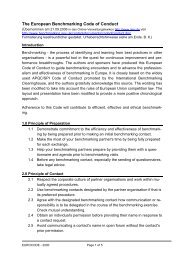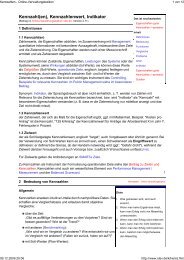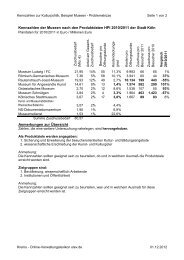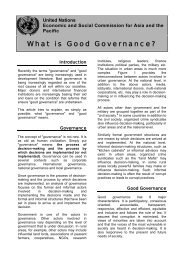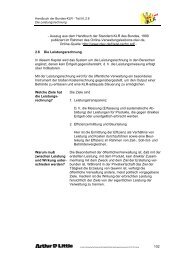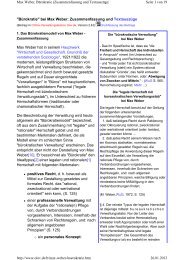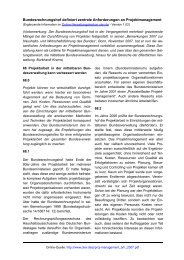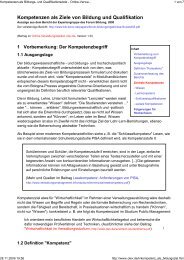Strategy Survival Guide
Strategy Survival Guide
Strategy Survival Guide
Create successful ePaper yourself
Turn your PDF publications into a flip-book with our unique Google optimized e-Paper software.
Economists<br />
Operational<br />
Researchers<br />
Scientists<br />
Social<br />
Researchers<br />
Statisticians<br />
Economics is concerned with macro issues of the economy as a whole – inflation,<br />
interest rates, employment, taxation, government spending etc, as well as micro issues<br />
such as resources allocation, labour supply, pricing, and consumer behaviour. Much of<br />
the work of economists is concerned with bringing an analysis of these issues to bear in<br />
determining the nature of economic and social problems and their causes, establishing<br />
the rationale for government intervention and the role of markets, and designing and<br />
appraising policy options. A chief economist in each department heads the economics<br />
specialism. See the Government Economic Service website for details of the kind of<br />
roles that economists play in each department<br />
Operational Research is the application of scientific methods to management problems.<br />
It aims to provide a rational basis for decision-making, by understanding and structuring<br />
complex situations. Often this involves building mathematical models to predict system<br />
behaviour and thereby assist the planning of changes to the system. Contact the<br />
Government Operational Research Service.<br />
The Office of Science and Technology leads for government in supporting excellent<br />
science, engineering and technology and their uses to benefit society and the economy.<br />
The OST also hosts ForeSight which aims to increase UK exploitation of science by<br />
either identifying potential opportunities for the economy or society from new science<br />
and technology, or considering how future science and technology could address key<br />
future challenges for society.<br />
Social research is about measuring, describing, explaining and predicting social and<br />
economic phenomena. In government, this relates to policy development,<br />
implementation and delivery and to the estimation of policy impacts and outcomes.<br />
Social research explores social and economic structures, attitudes, values and<br />
behaviours and the factors which motivate and constrain individuals and groups in<br />
society. Contact Government Social Research.<br />
National Statistics provides up-to-date, comprehensive and meaningful data on the<br />
UK's economy, population and society that can be used to create evidence-based<br />
policies and monitor performance against them.<br />
Data Sources<br />
The data and knowledge that inform strategy development and strategic thinking can and should come from<br />
a wide range of sources. Specific arrangements may be required in each situation to benefit from more<br />
informal sources such as the first-hand experience of front life professionals, but for more systemised data,<br />
there are a large number of readily accessible sources.<br />
Learning from experience<br />
There are many of ways of ensuring that up-to-date data and learning from the front-line is fed back into<br />
strategic thinking, including:<br />
• Publishing early drafts of proposals to elicit challenge and feedback<br />
• Using pilots and controlled experiments to test out options<br />
• Engaging stakeholder communities in ongoing dialogue<br />
• Identifying best practice and looking for lessons that can be learned<br />
• Encouraging horizontal networks of professionals, operating units and front-line staff to enable<br />
experience to be quickly shared<br />
• Responding to informal information and gossip (the NASA lesson from the Shuttle disaster)<br />
• Granting flexibility to innovate and break the rules (e.g. Health Action Zones) with "venture capital"<br />
equivalents to finance promising new ideas<br />
• Establishing contestability in public services to encourage new entrants and innovation (as in prisons<br />
and welfare)<br />
• Commissioning real time evaluations as well as formal ex-post evaluations<br />
Learning from systematised data<br />
<strong>Strategy</strong> work should make full use of the enormous volume of data that is routinely captured and<br />
systemised for publication by a wide range of institutions. Much of this data is readily accessible, often<br />
without charge via the internet. Techniques such as systematic reviews and meta-analysis (explained further<br />
<strong>Strategy</strong> <strong>Survival</strong> <strong>Guide</strong> – <strong>Strategy</strong> Skills<br />
Page 115



